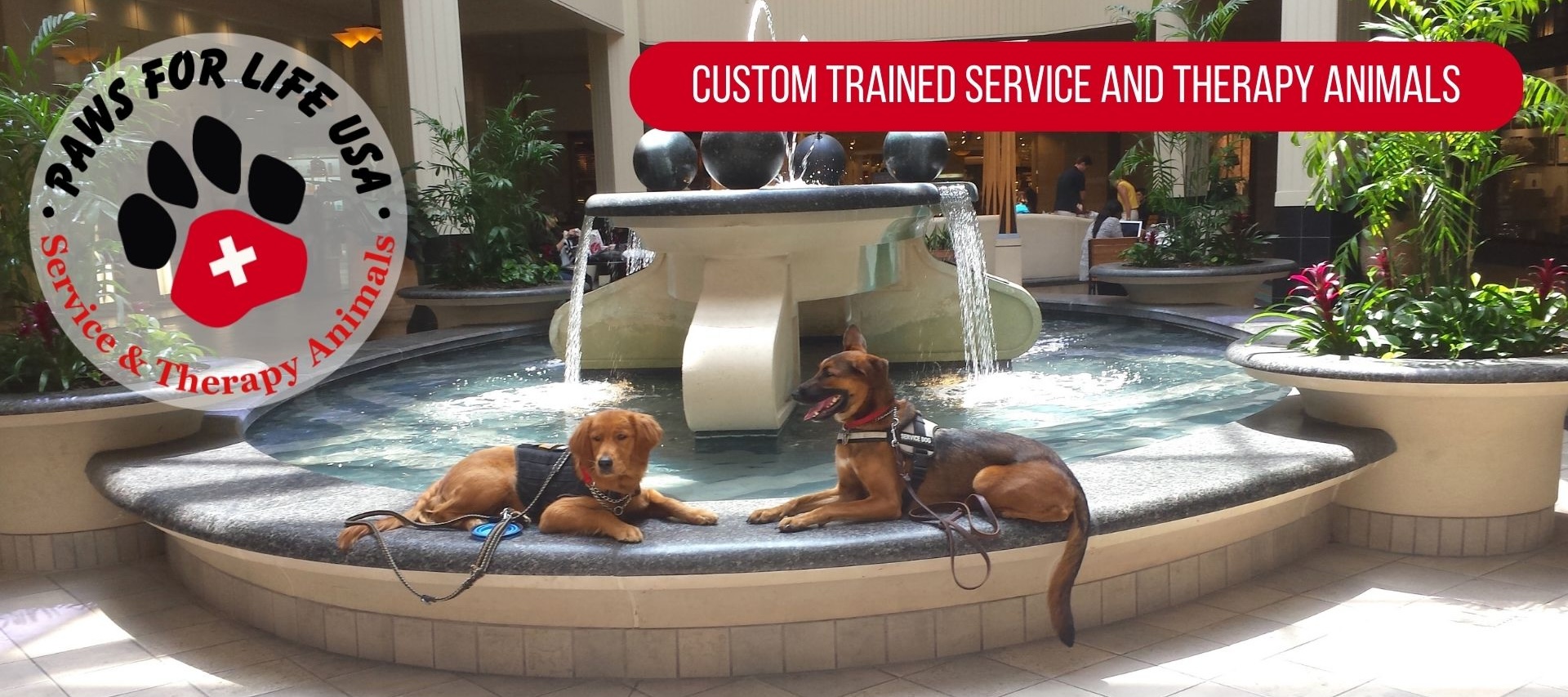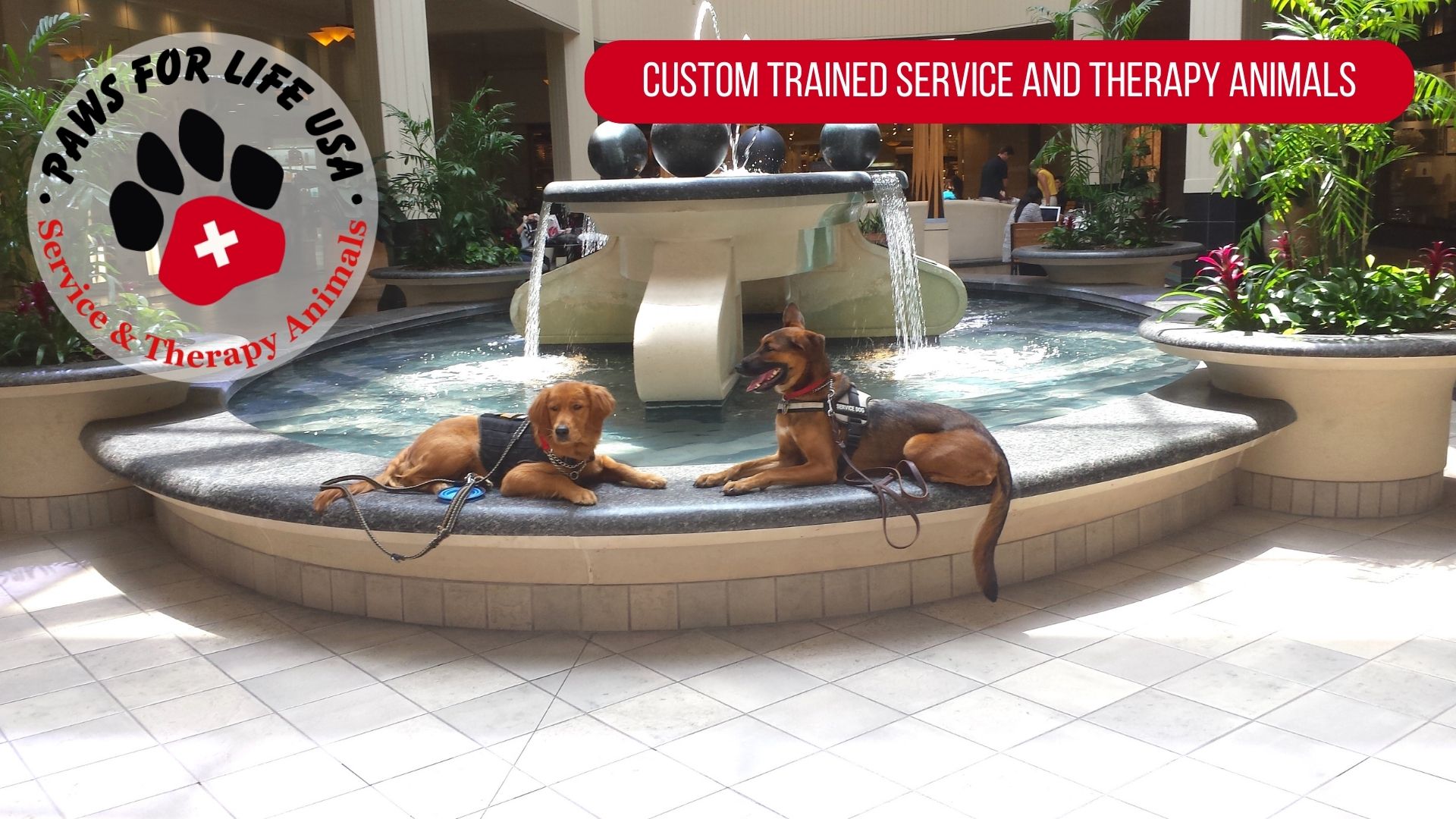Animals Deserve Better, Inc through its Paws For Life Veterans Program is making a difference in the lives of our Heroes.
Psychiatric Service dogs for psychological and psychiatric conditions provide key coping strategies to aid in the disabling symptoms associated with Mental Illness. Service dogs offer a unique, non-judgmental, ever present comfort. More importantly they serve as an early alert system to mood swings and emotional changes so the individual can engage in positive coping strategies and can lessen the severity of these symptoms by offering a variety of calming behaviors. The consistency of the service dog also eases fear of the unknown, because the service dog is always available to go for help or retrieve medication if needed.
PTSD Service Dogs for anxiety, panic, fear, irritability, depression, withdrawal, isolation, hyper-vigilance, loss of trust, nightmares, reoccurring flashbacks, phobias of crowds, phones, e-mail, stores, buildings, vehicles, unfamiliar people, insomnia, fatigue, pounding heart, migraines, difficulty concentrating, paranoia, sleepwalking, suicidal thoughts, anti-social behavior, suspicion, poor self-esteem are but some of the symptoms where one of our service dogs has proved useful.
Neurological and Mobility Assistance Dogs are trained to be the strength and movement for Veterans with all types of mobility issues. A service dog can perform many tasks for their hero handlers such as picking up dropped articles, pulling wheelchairs, assisting with walkers, turning lights on and off, opening and closing doors, carrying items, and pulling their companions out of bed.
In general petting a dog decreases the release of cortisol and increases the release of oxytocin into the bloodstream. Decreases in cortisol lower blood pressure and facilitate a sense of relaxation, while increases in oxytocin, this same chemical released when a mother nurses her infant, will facilitate a sense of security and well-being.
For veterans with PTSD, it has been documented that a dog helps with emotional regulation. Veterans who are very anxious and have anger issues find they can’t work with a dog if they yell. They must have a calm voice. Working with a dog helps build confidence and bridge the gap with strangers. More often than not the response and the bond is immediate.
A female veteran with PTSD has sleep disorders and often awakens to find herself barricaded in her closet, behind duffle bags, with a knife. Simply having a dog around allows the veteran to trust the dog to assess the safety of their surroundings, as the dogs have a much keener sensory capacity than people and allow her to sleep secure.
We have learned that veterans often suffering alone seem to silence themselves because of the stigma still attached to psychological injuries like PTSD. Our dogs can calm them down and get their minds off of everything going on in their lives by focusing on the dog not themselves. There is life after injuries. This new quality of life just might be, in part, based on a PTSD SERVICE DOG. The dogs will have the ability to decrease isolation of the veteran, decrease the needs for many medications, decrease anxiety and panic attacks when in crowded public places, be able to awaken them from nightmares and flashbacks, ‘have their backs’ when necessary, to name but a few.
For hundreds of wounded veterans, the long walk to recovery is often a lonely one. A long walk is something most dogs love. PTSD symptoms caused by witnessing or participating in a traumatic event can affect two people, standing side by side, differently. PTSD is rarely cured; it can be treated. Whether ‘acute,’ ‘chronic,’ or ‘delayed,’ effective treatments can vary from wounded warrior to wounded warrior.
Physical, behavioral, and/or emotional symptoms can be helped tremendously by the presence of a custom well-trained dog. Anxiety, panic, fear, irritability, depression, withdrawal, isolation, hyper-vigilance, loss of trust, nightmares, reoccurring flashbacks, phobias of crowds, phones, e-mail, stores, buildings, vehicles, unfamiliar people, insomnia, fatigue, pounding heart, migraines, difficulty concentrating, paranoia, sleepwalking, suicidal thoughts, anti-social behavior, suspicion, poor self-esteem are but some of the symptoms where one of our service dogs has proved useful.
Dogs might be huggable to look at, but they have a far more important role to play – to help re-integrate military veterans scarred by war.
For hundreds of wounded veterans, the long walk to recovery is often a lonely one. A Service Dog can make a world of difference.



